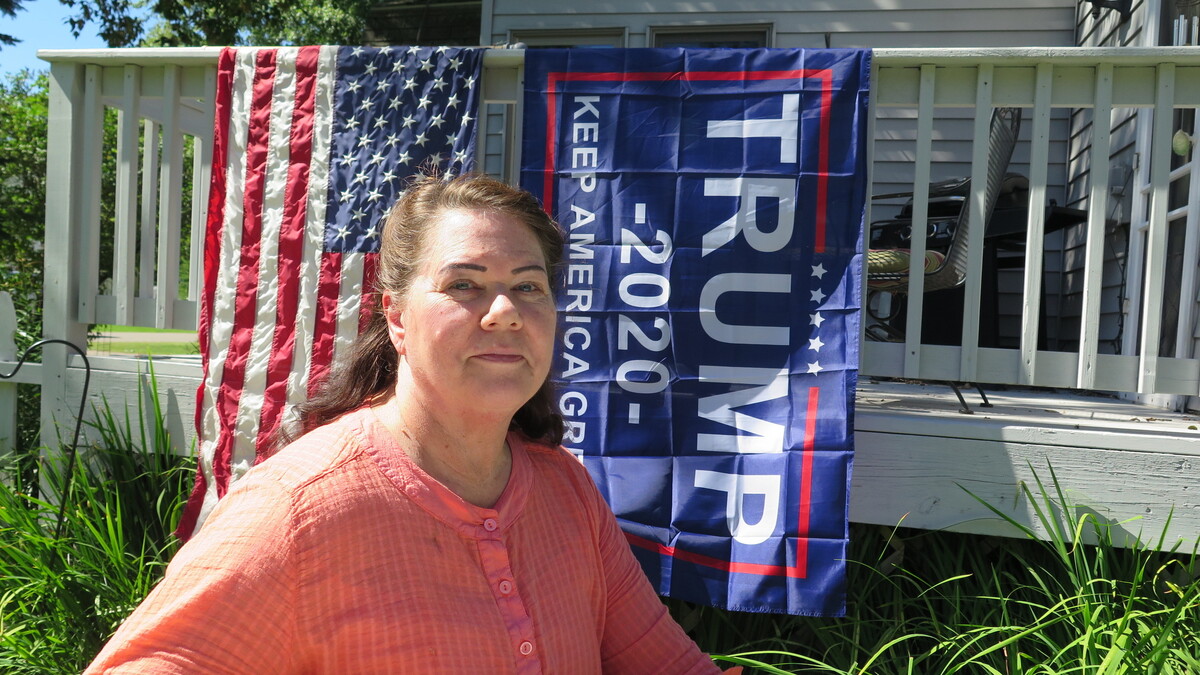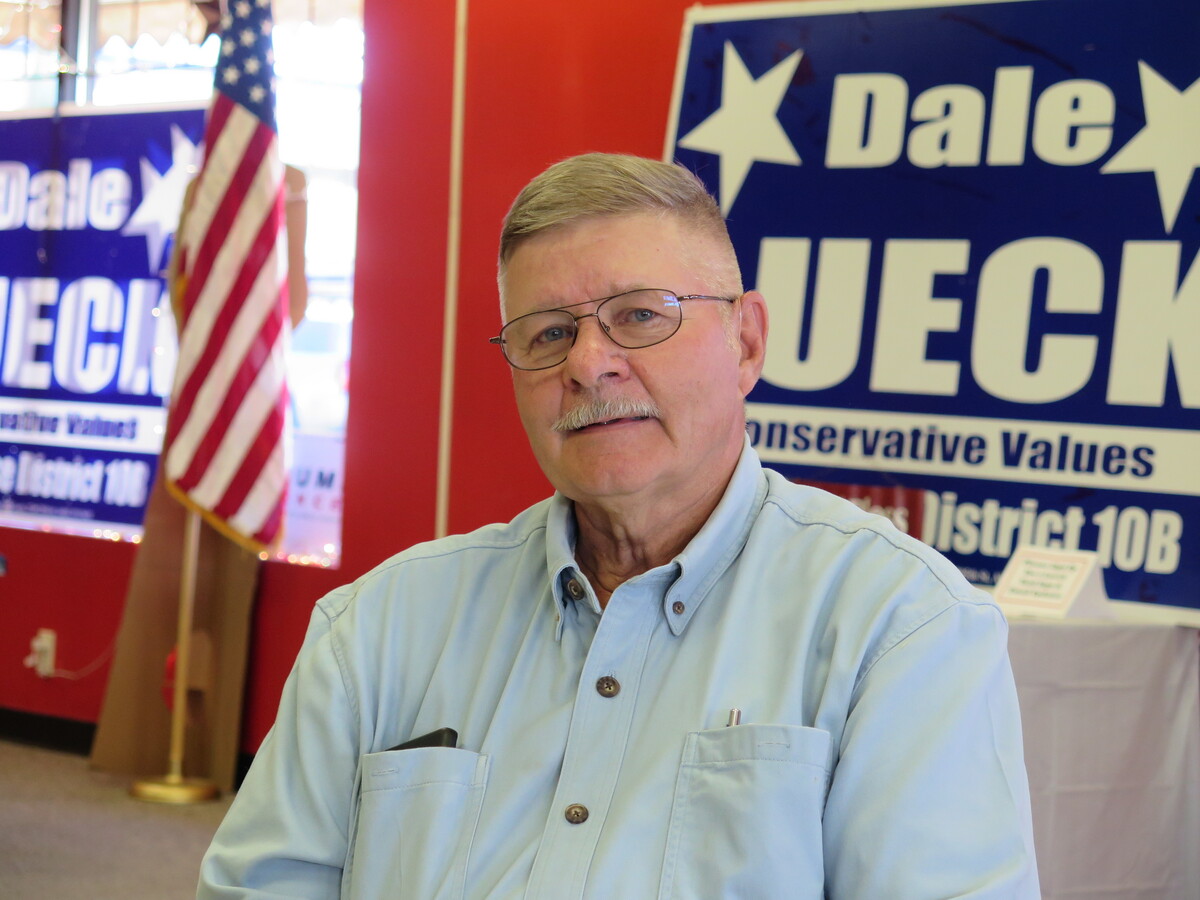
[ad_1]

Deb Ibanez, who proudly displays Trump banners and lawn signs outside her home in Aitkin, Minn., is part of President Trump’s firm base in this rural part of the state. Ibanez says she’s worried about voter fraud and doubts about the outcome of the election.
Mark Zdechlik/MPR News
hide caption
toggle caption
Mark Zdechlik/MPR News

Deb Ibanez, who proudly displays Trump banners and lawn signs outside her home in Aitkin, Minn., is part of President Trump’s firm base in this rural part of the state. Ibanez says she’s worried about voter fraud and doubts about the outcome of the election.
Mark Zdechlik/MPR News
Democrats could find a growing problem for their party with a voter named Gretchen, sitting outside a brew pub in the rural northern Minnesota town of Aitkin.
“I’m kind of disillusioned, and I’m really confused,” she said. “I’m a registered Democrat, but yet, I see all of this stuff that I kind of disagree with.” Gretchen asked not to be identified with her last name because she fears sharing her politics could hurt her family’s business.
She doesn’t like President Trump and voted for Hillary Clinton four years ago. But she’s no longer happy with Democrats. She opposes the face mask mandate Minnesota’s Democratic governor ordered, in addition to blaming Democrats for recent rioting that has accompanied some protests in Minneapolis-St. Paul and other urban areas.
So, this former Clinton voter is backing Trump.
“The Republican Party is kind of speaking to my heart more than the Democrats,” Gretchen said.
Not long ago, Democrats had solid support in much of rural Minnesota, but that’s eroded. Bill Pick, leader of the Aitkin County Democratic Party, says he did not see the turn coming. He calls it “mind boggling.”
“It’s really sad to see that there’s a potential of Minnesota going to be a red state,” Pick lamented while sitting at a picnic table at a park in Aitkin.

Bill Pick, leader of the Aitkin County Democratic Party, called the erosion of support for Democrats in rural Minnesota “mind boggling.” “It’s really sad to see that there’s a potential of Minnesota going to be a red state.”
Mark Zdechlik/MPR News
hide caption
toggle caption
Mark Zdechlik/MPR News

Bill Pick, leader of the Aitkin County Democratic Party, called the erosion of support for Democrats in rural Minnesota “mind boggling.” “It’s really sad to see that there’s a potential of Minnesota going to be a red state.”
Mark Zdechlik/MPR News
Trump came very close to flipping Minnesota in 2016, as he upset Hillary Clinton with a surge of rural support in other northern industrial states that Democrats banked on, like Wisconsin, Michigan and Pennsylvania. Trump only lost Minnesota by about 44,000 votes, a margin he hopes to overcome in 2020.
Both Donald Trump Jr. and Jill Biden, the wife of the Democratic nominee, planned visits in the state on Wednesday, a sign that both campaigns see Minnesota in play as Trump maintains strong support in rural areas.
Republican state Rep. Dale Lueck has been representing Aitkin and the surrounding area in the Minnesota Legislature since defeating a Democrat six years ago. He says growing support for Republicans in rural Minnesota has a lot to do with economics and urban Democrats’ environmentalism, which threatens new mining and fossil fuel energy jobs.
“It should be no surprise that people are just plain done with the, ‘Oh no, we can’t do anything here because we might hurt the environment,’ and we’re just not going to take it anymore,” Lueck said.

State Rep. Dale Lueck. represents Aitkin and the surrounding area in the Minnesota Legislature. He says growing support for Republicans in rural Minnesota has a lot to do with economics and urban Democrats’ environmentalism, which threatens new mining and fossil-fuel energy jobs.
Mark Zdechlik/MPR News
hide caption
toggle caption
Mark Zdechlik/MPR News

State Rep. Dale Lueck. represents Aitkin and the surrounding area in the Minnesota Legislature. He says growing support for Republicans in rural Minnesota has a lot to do with economics and urban Democrats’ environmentalism, which threatens new mining and fossil-fuel energy jobs.
Mark Zdechlik/MPR News
University of Minnesota political science professor Larry Jacobs says places like Aitkin County are no longer the priority for Democrats that they once were.
“Democrats talk about fighting for rural Minnesota, but their policies and their voters have in effect written off rural Minnesota,” said Jacobs.
Jacobs says the partisan divide between urban and rural Minnesota trailed the split that developed nationally decades ago, with Democrats hanging on longer in no small part because of a strong union mining economy in northern Minnesota. Many of those jobs are now gone, and Jacobs says Minnesota now looks much more like the rest of the country.
Biden’s lead in Minnesota polls has remained in the single digits lately, though it has been consistent. Political analyst Todd Rapp says Minnesota Republicans still face a steep hurdle in statewide elections.
“I still think Biden is the favorite and a solid favorite in Minnesota in large part because there’s such a strong core Democratic vote in the central cities and the first and second ring suburbs,” Rapp said.
Back in Aitkin County, most people will vote by mail this fall because of the pandemic. Deb Ibanez, who proudly displays Trump banners and lawn signs outside her home, says she’s worried about voter fraud and doubts about the outcome.
Given recent civil unrest, Ibanez fears there could be an uprising if Trump loses.
“I would pray that we as Republicans would graciously bow down to it, but I don’t know, you could be waking a sleeping giant, too,” Ibanez said.
[ad_2]
Source link


